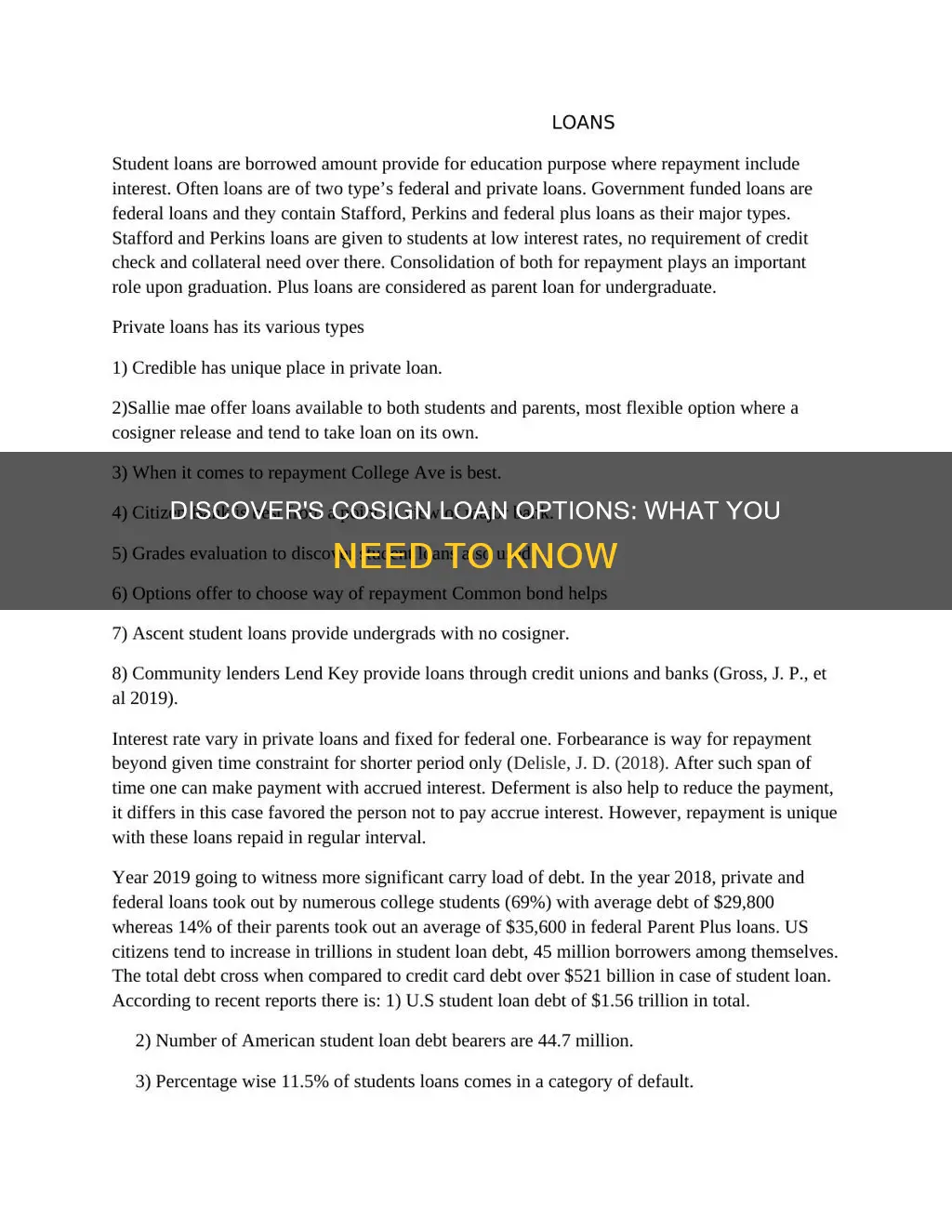
Discover offers student loans for college and graduate school, which can be used to pay for college. Discover Student Loans can help borrowers find the best private student loan to fit their needs. Discover also provides resources for students and parents to learn about cosigning a student loan, including tips and strategies for cosigners. Discover's website outlines the impact of cosigning on credit scores and suggests that cosigners have conversations about repayment plans with the student. Discover no longer services student loans, with all loans having been transferred to Firstmark Services between September 7 and November 16, 2024. Discover also offers personal loans, which can be used for various purposes, including debt consolidation, large purchases, and emergency funds.
| Characteristics | Values |
|---|---|
| Student Loans | Discover Student Loans can help you find the best private student loan to fit your needs. |
| Cosigner | Only one person can cosign the student loan. The cosigner is responsible for the life of the loan. |
| Cosigner's Credit Score | A cosigner with a strong credit history can help secure a lower interest rate. |
| Cosigner's Responsibility | The cosigner is equally liable to repay the loan plus interest. |
| Cosigner Release | Discover does not provide an option for cosigner release. |
| Personal Loans | Discover Personal Loans are based on a person's income and credit profile. |
| Interest Rates | Interest rates are determined on a case-by-case basis. |
| Loan Application | Discover does not do business with loan brokers, nor does it charge a fee for a loan application. |
What You'll Learn

Discover no longer services student loans
Discover Student Loans previously provided loans for college students and helped students find the loan that was right for them. They also offered advice on finding college roommates and provided information on comparing private student loans.
However, Discover is no longer servicing student loans. The servicing of Discover student loans has been transferred to Firstmark Services, the borrower-facing brand for Nelnet. Nelnet is a publicly traded company with extensive experience in the student loan industry.
Discover's exit from the student loan business was announced by interim CEO and President John Owen, who stated that the decision was made after a regular review of the strategic fit of the company's businesses. Owen emphasized that the move would allow Discover to focus on its core banking products, growth opportunities, and delivering long-term shareholder value.
As a result of this change, borrowers with Discover student loans will now need to contact Firstmark Services for any questions, payments, or other loan-related matters. All loans were transferred to Firstmark between September 7 and November 16, 2024, and borrowers should refer to the welcome communications received from Firstmark for instructions on setting up their new accounts.
The Discover Student Loans website is expected to remain available through at least April 2025, and billing statements and tax documents will be accessible in the Discover Student Loans Account Center until then. Discover will also forward any payments received after the transfer date to Firstmark for a short period.
Loans, Advances, and Current Assets: What's the Verdict?
You may want to see also

Cosigner release and its requirements
Discover is no longer servicing student loans. The servicing of Discover student loans has been transferred to Firstmark Services.
In general, a cosigner release is the process of removing a cosigner from a loan. The requirements for a cosigner release vary depending on the lender. Here are some common requirements:
- Making a specific number of consecutive, on-time monthly payments, typically 12.
- Meeting credit requirements, such as having a minimum credit score and providing proof of income.
- Providing proof of graduation or completion of a certificate program.
- Being a U.S. citizen or permanent resident.
- Demonstrating a satisfactory payment history and being current on all loan payments.
- Uploading the completed application and any required documentation, such as proof of income and graduation certificates.
Loan Forbearance and PSLF: COVID-19's Impact
You may want to see also

Tips for parents cosigning a college loan
If you're considering cosigning a college loan for your child, there are several important factors to keep in mind. Firstly, understand that cosigning a loan means you are equally responsible for the debt. This means that if your child cannot make payments, you will be expected to pay. It's essential to have open and honest conversations with your child about their financial situation and their ability to repay the loan.
Secondly, be aware of the potential impact on your credit score. Cosigning a loan can increase your debt-to-income ratio, which may adversely affect future credit decisions and your ability to secure a mortgage. It's recommended to hold off on applying for a mortgage or refinance for at least six months to a year after cosigning to minimize the impact on your credit score.
Thirdly, consider the potential benefits of cosigning. If you have a strong credit history, your cosignature could help secure a lower interest rate on the loan. This can make the loan more affordable for your child in the long run.
Additionally, it's important to discuss repayment plans and potential worst-case scenarios with your child. Decide how you will handle the loan repayment if your child is unable to secure a well-paying job after graduation. Come to an agreement on how long you'd be willing to pay the loans and whether your child would be responsible for repaying you.
Lastly, remember that cosigning provides an opportunity to educate your child about borrowing, credit, and debt. Ensure your child understands the impact of the loan on both your credit reports and the importance of timely repayment.
While cosigning a college loan can be beneficial, it's essential to carefully consider the potential risks and benefits before making a decision.
Consolidating Private Loans: Forfeit Federal Benefits?
You may want to see also

Discussing repayment plans with your cosigner
Discover Student Loans can help you find the best private student loan to fit your needs. However, Discover is no longer servicing student loans, and the servicing of your Discover student loan has been transferred to Firstmark Services.
Discuss what you can reasonably afford to pay toward your loans
When you don't have a job right out of college, or you do but aren't making a lot of money, you may need to ask your cosigner to handle the student loan repayment temporarily. Talk about how that kind of situation would be handled if you can't pay, but your cosigner can. Specifically, discuss how long they'd agree to pay the loans and whether you'd be responsible for paying your cosigner back down the line.
Consider a cosigner release
A release keeps your loan terms the same but removes your cosigner's name from the loans. You will need a good credit score for this option, as lenders generally use credit history, income, and expenses to determine if you qualify for a cosigner release. There may be additional requirements from the lender for a cosigner release, such as making a specific number of consecutive payments before qualifying for a release.
Discuss the worst-case scenario
Ideally, your student loan repayment plans will go smoothly, but discussing the worst-case scenario can help prepare you and your cosigner if you encounter any challenges. For example, if neither you nor your cosigner can pay, the consequences can affect both of your credit scores if there are late payments. There could also be late fees and penalties that could accumulate on the loan.
Choose the right cosigner
Only one person can cosign the student loan, so consider having the parent with the stronger credit history act as the cosigner. This can help secure a lower interest rate. However, the student loan could adversely affect future credit decisions due to the parent's increased debt relative to their income.
Understand the risks and responsibilities
Before agreeing to cosign a loan, ask the main borrower to make a budget and show you how they plan to repay the loan. Ensure the monthly loan payments are affordable for both of you. If the borrower loses their job or has a change in finances, can you afford to pay the loan? Also, be aware that you are equally responsible for making on-time loan payments, even if you get divorced and even if there is a prenuptial agreement.
Dire Consolidation Loans: Two-Part Payment Plans?
You may want to see also

Applying for a Discover personal loan
Discover offers a wide variety of financial products, including personal loans. Discover personal loans are unsecured loans that can be used for debt consolidation, paying for major expenses, and more. The loan amount ranges from $2,500 to $40,000 and can be repaid over a flexible duration. Discover does not charge any upfront fees or origination fees for personal loans. Additionally, they offer repayment assistance and have a highly-rated mobile app for customers.
To apply for a Discover personal loan, there are a few minimum requirements that must be met:
- Have a valid U.S. Social Security Number (SSN)
- Be at least 18 years old
- Have a minimum individual or household annual income of $25,000
- Have a physical address, an active email address, and access to a computer or mobile device to complete the online application process
Once you meet these basic eligibility criteria, several other factors are considered during the application process, including your credit history, recent credit activities, and credit inquiries registered in your name. It is recommended to pre-qualify for a loan to get an idea of the annual percentage rate (APR) you might qualify for. During pre-qualification, Discover will ask for your name, contact information, the desired loan amount, the purpose of the loan, and the desired loan term.
After pre-qualification, you can proceed to formally apply for the loan. In addition to the information provided during pre-qualification, you may need to submit supporting documents such as pay stubs, bank statements, tax documents, and a copy of your government-issued ID. Discover will then perform a hard credit check to determine your eligibility for the loan. Finally, you will need to review and accept the loan offer by signing the loan contract electronically.
It is important to note that a hard credit check may cause a minimal decrease in your credit score. Discover advises that disbursement of loan funds may take longer if there are errors in the application, if the loan is funded on a weekend, or if you request funds to be delivered by a method other than the standard process. Typically, funds can be sent as early as the next business day after acceptance.
Consolidating Loans: Cheaper or Costly?
You may want to see also
Frequently asked questions
Discover does do co-sign loans, specifically for students. However, Discover is no longer servicing student loans, so you will need to contact Firstmark for questions, payments, and anything else related to your loan.
A co-sign loan is when a creditworthy adult, such as a parent or guardian, signs a loan with a student. The creditworthy adult will agree to take full responsibility for the debt and will be equally liable to repay the loan plus interest.
A co-sign loan can help the student secure a lower interest rate, which can save them hundreds or thousands of dollars in interest over the life of the loan. It also helps the student establish credit, and on-time payments will improve the credit scores of both the student and the co-signer.
If the student cannot make the payment on the loan, the co-signer will need to take over the remaining payments. This could impact the co-signer's financial situation and their relationship with the student. Late payments will also affect the credit scores of both the student and the co-signer.







